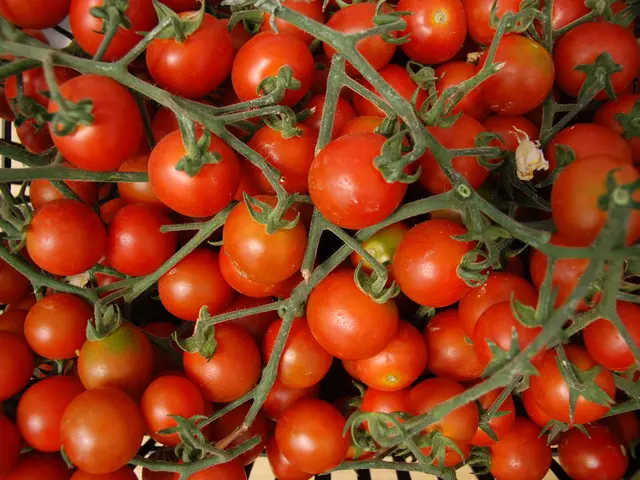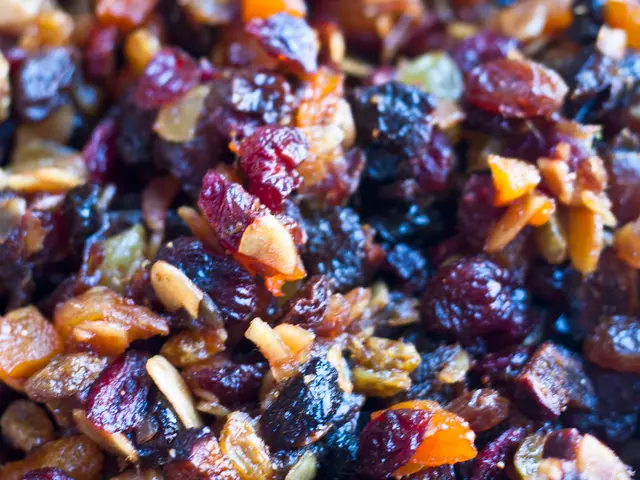Fifteen Eats to Alleviate Seasonal Allergies Symptoms
Combating seasonal allergies naturally is achievable with certain foods that offer relief by reducing inflammation, stabilizing histamine levels, and supporting immune health. This nutrient-rich diet can be a sustainable approach to minimize discomfort during allergy season. The following 15 powerful foods can help alleviate symptoms and foster overall well-being.
1. Citrus Fruits
Packed with vitamin C, citrus fruits like oranges, lemons, limes, and grapefruits are potent antioxidants that boost the immune system and reduce histamine levels, combating oxidative stress caused by allergens. Incorporate these fruits in drinks, salads, and baked goods to provide refreshing relief.
2. Leafy Greens
Leafy greens, such as spinach, kale, Swiss chard, and arugula, are nutrient-dense and contain quercetin, a natural antihistamine that reduces allergy symptoms like itchy eyes and sneezing. These greens are also rich in vitamins A, C, and K, which contribute to overall immune health. Add them to smoothies, salads, or meals for a healthy boost.
3. Ginger
Well-known for its anti-inflammatory properties, ginger can help reduce swelling in nasal passages, soothe irritation, and promote easier breathing. Its spiciness also aids in clearing mucus and opening airways. Consume ginger as tea, grate it into dishes, or blend it into smoothies for a revitalizing effect.
4. Turmeric
Turmeric's active compound, curcumin, is a powerful anti-inflammatory agent that helps combat swelling and irritation from allergies. Use turmeric in curries, soups, or rice dishes, or prepare golden milk as a soothing beverage to receive its full benefits.
5. Local Honey
Local honey may desensitize the body to local pollen over time, potentially reducing allergy severity. Incorporate this sweetener into tea, yogurt, or oatmeal for potential allergy relief and its antibacterial properties, which soothe sore throats or coughs linked to seasonal allergies.
6. Onions
Rich in quercetin, onions are natural antihistamines that stabilize histamine levels and reduce inflammation. Use onions raw, caramelized, or cooked in soups, stews, and sautéed dishes for allergy relief and immune support.
7. Garlic
Garlic is an immune booster with anti-inflammatory properties that aids in alleviating respiratory discomfort associated with allergies. Incorporate garlic into dressings, sauces, or roasted vegetable dishes, or mince it into soups, sautéed dishes, or dips for added flavor and health benefits.
8. Pineapple
Pineapple's bromelain enzyme has decongestant and anti-inflammatory properties that help reduce nasal swelling, improve sinus function, and ease breathing during allergy season. Enjoy fresh pineapple as a snack, blend it into smoothies, or include it in fruit salads for allergy relief.
9. Fatty Fish
Fatty fish like salmon, mackerel, sardines, and trout are rich in omega-3 fatty acids, which reduce airway inflammation and support overall immune function. Grill, bake, or pan-sear this fish and pair it with leafy greens or roasted vegetables for an allergy-friendly meal.
10. Nuts and Seeds
Almonds, walnuts, flaxseeds, and chia seeds are packed with omega-3 fatty acids and magnesium, both of which combat inflammation, support immune function, and stabilize histamine levels. Sprinkle them on oatmeal, yogurt, or salads, or blend them into smoothies as part of an allergy-fighting diet.
11. Apples
Apples are an excellent source of quercetin, which acts as a natural antihistamine to alleviate symptoms like sneezing and nasal congestion. Incorporate apples regularly into your diet, either as a snack, side dish, or ingredient in baked goods, for allergy relief.
12. Berries
Berries like blueberries, strawberries, raspberries, and blackberries are packed with antioxidants, which strengthen the immune system, reduce inflammation, and support hydration- crucial during allergy season. Add berries to smoothies, cereals, or yogurt or enjoy them as a standalone snack for added protection.
13. Green Tea
Green tea contains antioxidants and anti-inflammatory compounds that soothe nasal passages, support respiratory health, and can reduce allergy symptoms. Regularly drink this soothing brew or use matcha as a concentrated source of these benefits.
14. Sweet Potatoes
Sweet potatoes are rich in beta-carotene, which converts into vitamin A in the body, supporting immune health and reducing inflammation. Bake, roast, or mash sweet potatoes for a comforting side dish or spiralize them into noodles for creative twists on traditional recipes.
15. Probiotic Foods
Probiotic-rich foods like yogurt, kefir, kimchi, and sauerkraut promote gut health, which is closely linked to immune function. Maintaining a healthy gut microbiome can help modulate immune responses and reduce allergy severity.
By integrating these nutrient-dense foods into your diet, you can minimize allergy symptoms during the allergy season, breathe easier, and enjoy improved overall well-being.
- Incorporating citrus fruits like oranges, lemons, limes, and grapefruits in your diet can help boost immune systems, reducing histamine levels and combating oxidative stress caused by allergens.
- Leafy greens such as spinach, kale, Swiss chard, and arugula can support immune health, offering quercetin – a natural antihistamine – that reduces allergy symptoms.
- Ginger, with its anti-inflammatory properties, can help alleviate symptoms like nasal swelling and soothe irritation, promoting easier breathing during allergy season.
- Turmeric's active compound curcumin has potent anti-inflammatory agents that can combat inflammation and irritation triggered by allergies.
- Local honey may help reduce allergy severity by desensitizing the body to local pollen over time, offering potential relief and antibacterial properties.
- rich in quercetin, onions act as natural antihistamines, helping stabilize histamine levels and reduce inflammation during allergy season.
- Garlic serves as an immune booster with anti-inflammatory properties, assisting in alleviating respiratory discomfort associated with allergies.
- Pineapple's bromelain enzyme possesses decongestant and anti-inflammatory properties, reducing nasal swelling, improving sinus function, and easing breathing during allergy season.
- Consuming omega-3 fatty acid-rich fish like salmon, mackerel, sardines, and trout can reduce airway inflammation and support overall immune function during allergy season.
- Nuts and seeds, such as almonds, walnuts, flaxseeds, and chia seeds, offer omega-3 fatty acids and magnesium, perfect for combating inflammation and stabilizing histamine levels.
- Apples, an excellent source of quercetin, can alleviate symptoms like sneezing and nasal congestion, making them an essential addition to an allergy-friendly diet.
- Berries like blueberries, strawberries, raspberries, and blackberries are packed with antioxidants, helping strengthen the immune system, reduce inflammation, and support hydration during allergy season.
- Green tea, brimming with antioxidants and anti-inflammatory compounds, can soothe nasal passages, support respiratory health, and reduce allergy symptoms during the allergy season.
- Sweet potatoes, loaded with beta-carotene, support immune health and reduce inflammation during allergy season.
- Probiotic-rich foods like yogurt, kefir, kimchi, and sauerkraut can maintain a healthy gut microbiome, helping modulate immune responses and potentially reduce allergy severity during allergy season.







